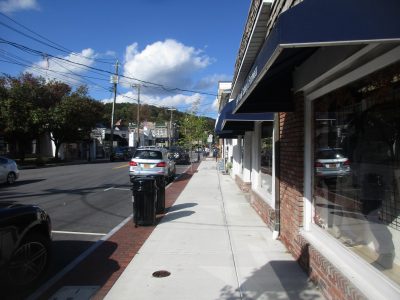Consultant to Receive $95G More for Controversial Form Based Code Work in Chappaqua

The Town of New Castle is expected to receive the preliminary Final Generic Environmental Impact Statement (FGEIS) related to the Form Based Code by July 8 but it will cost the town an additional $95,000.
In correspondence with the town, Kimley-Horn Engineering and Landscape Architecture of New York is bumping up the price of the document and the preliminary findings statement in part because several of the 512 letters submitted from the public required response that “exceeded the scope of the original contract due to their technical nature and level of detail.”
The preliminary findings statement is expected to arrive three weeks after the preliminary FGEIS.
Last week, the Town Board approved a change order of $81,000 for Kimley-Horn to address issues raised in four correspondences; additional economic and market analyses to test the impact of 10 percent affordable housing on the feasibility of a three- and four-story building assuming two different levels of affordability in the North Greeley Avenue corridor; and work to identify thresholds of development regarding sewer capacity.
An additional $14,000 is being charged by Kimley-Horn for the findings statement.
One of the correspondences that Kimley-Horn is responding to and referred to in its letter to the town, from Residents United to Save the Chappaqua Hamlet, is 116 pages. Another from the Chappaqua School District is seven pages along with a 71-page attachment from the district’s consultants.
The board approved the change order by a 4-1 vote, with Councilwoman Lisa Katz, who has been heavily critical of the Form Based Code, opposed. She argued that Kimley-Horn’s fee was based on responding to comments to produce an FGEIS.
“They’re saying there are too many things to respond to but maybe if they did a better job the first time, they wouldn’t have so many things to respond to,” Katz remarked. “To me, they’re kind of extorting us for that.”
The original contract was for $399,984, followed by two previous change orders totaling $46,600, according to Town Administrator Jill Shapiro.
Town Attorney Ed Phillips said the negotiations with Kimley-Horn were blunt and at times difficult. However, it resulted in a substantial reduction in additional fees from what they had requested, he said. He did not say what Kimley-Horn had initially requested for additional fees.
However, the town also has to be a bit cautious because the contract allows for either side to terminate the contract for any reason with 30 days’ notice, Phillips said, potentially resulting in the town having to re-initiate a Request for Proposal (RFP). Instead, a compromise was sought.
“So that created a concern that if we couldn’t come to some kind of compromise, they could walk and we’d have to start over again with an RFP process and bring in a new consultant and bring them up to speed, and that, frankly, wasn’t a very attractive option for most of the people on the Town Board,” Phillips said.
Deputy Supervisor Jeremy Saland said that in the negotiating session that he was involved in he was very assertive in pushing back. However, municipalities are not private entities, which have far greater freedom to retain or cut ties with contractors when there are disputes.
“We needed to move the project forward. We believe in it,” Saland said. “I know you have a different opinion, but to spend more money just to chase that, to push that forward a month-and-a-half from now would have been asinine.”
Katz responded that she would have been willing to play hard ball with Kimley-Horn. She said the consultant would have been hesitant to pull out from the contract because it would have harmed their reputation.
Supervisor Ivy Pool said had the consultant not been able to finish the work for the agreed-upon fee, then she would have agreed with Katz. But there were too many unforeseen circumstances for them to address for the original fee.
“I don’t think a change order like this is outside of what is normal and what we see from these kinds of projects every day,” Pool said.
Controversy over the Form Based Code has raged since last fall regarding the proposed rezoning plan, placing the issue front and center in the June 22 Democratic primary and this year’s town election.

Martin has more than 30 years experience covering local news in Westchester and Putnam counties, including a frequent focus on zoning and planning issues. He has been editor-in-chief of The Examiner since its inception in 2007. Read more from Martin’s editor-author bio here. Read Martin’s archived work here: https://www.theexaminernews.com/author/martin-wilbur2007/
